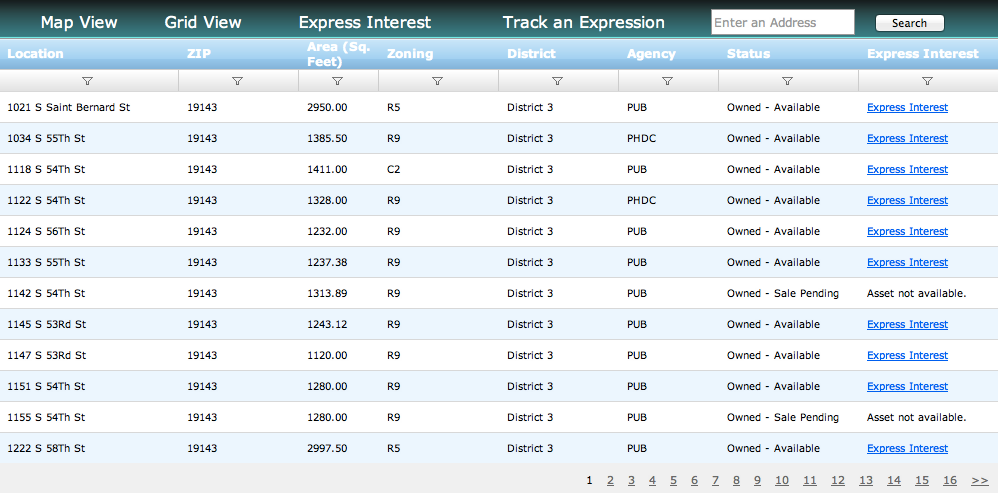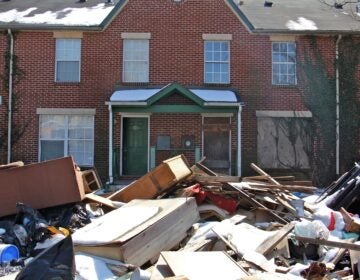City’s “Front Door” cracks open
At last, the city’s enormous inventory of mostly vacant surplus land is being made available online for would-be buyers.
The Philadelphia Redevelopment Authority’s “Front Door” – essentially a database and map of the city’s property holdings, coupled with a streamlined sales process – has been in the works for over a year and a half. Some of it goes live today, albeit in a limited form, on the PRA’s website.
The initiative – which won’t be formally launched until next month – represents the Nutter administration’s most notable achievement to date in Philadelphia’s long-running fight against blight.
There are an estimated 40,000 vacant parcels in Philadelphia, empty lots and abandoned buildings that depress property values, mar neighborhoods and pose safety risks. Of those, more than 12,000 are owned by city-related agencies.
Before the Front Door, would-be buyers of those city owned lots were forced to navigate a confusing bureaucratic thicket of city land-holding agencies with conflicting policies and agendas, without the benefit of a written rulebook.
Now, the Nutter administration contends, developers, non-profits and average residents will be able to easily submit applications to purchase city owned vacant properties through the PRA’s Front Door. And the entire process will be governed by a new policy document (which has been previously reported on by PlanPhilly).
“What’s different about this (policy) is that it exists. There are no policy documents that exist right now for the disposition of land certainly none that are consistent, none that are comprehensive,” said Bridget Greenwald, the new commissioner of the city’s Public Property department.
Crafting the policy – in consultation with 15 city agencies and hundreds of stakeholders – is “in itself a big accomplishment,” Greenwald said.
And yet, for all the progress, the Front Door does not meaningfully address many other problems associated with the 40,000 vacant lots in Philadelphia. For one, the new policy makes no mention of acquisition. The Front Door is not a land bank, and the Nutter administration remains non-committal on legislation proposed by Councilwoman Maria Quiñones-Sánchez to create a land bank.
Nor does the Front Door address the problems created by privately-owned vacant lots, or the epidemic of property tax delinquency, which are both huge contributors to the city’s blight crisis.
And the initiative does nothing to curb the practice known as councilmanic privilege or prerogative. The City Charter requires City Council approval any time a city-owned property is sold. And because of the councilmanic prerogative tradition – in which the whole of council defers to the judgment of the district council person who represents the affected property – individual council members have effective veto power over city property sales in their districts.
Because of that, the new disposition policy requires would-be purchasers to win the support of their district council member in order to buy the property.
“We can’t change how council conducts its business,” said John Carpenter, deputy executive director of the Philadelphia Redevelopment Authority. Later, he added: “I know it’s a big issue … this system was not intended to tackle that issue in any fashion.”
Even so, the Front Door seems to be a significant improvement over the confusing status quo that has prevailed for decades.
The most impressive feature of the new initiative is its online component, which maps 9,000 city owned vacant properties, and provides a webform for qualified buyers to initiate a purchase of any of the lots. The site, which was previewed to reporters on Monday, appears user friendly and comprehensive, and it should go a long way toward demystifying the city’s holdings and making it easier for all qualified buyers to purchase city-owned land.
It was also done on the cheap: just $350,000 for the site itself and the new customized software program and database that drives both the site and the city’s property sales workflow. If the figure seems high, consider that the Street administration allocated $5 million for a Vacant Land Management Information System as part of the Neighborhood Transformation Initiative, and still failed to leave behind an accurate inventory of city owned land.
Even now, the city acknowledges that it knows very little about the properties it owns, a failing chalked up to the size of the inventory, poor record keeping in the past and the limited resources available to the city’s land-owning agencies.
“In fact, we know so little about it from an eyes-on perspective that we’re not willing to present in this website condition information of any sort,” Carpenter said.
The city hopes to add information about the condition of properties – and possibly photos – to the new site over time.
Perhaps the site’s most promising features – upfront pricing of most properties – won’t roll out for at least a few more weeks. In the past, buyers were kept in the dark on the price of the property until near the end of the process, when an appraiser was brought in. Now, though, prices will be set using a computerized mass appraisal system, meaning that buyers won’t be hit with sticker-shock after investing months of time pursuing a property.
And the city is now once again willing to sell property for nominal rates. Previously, the Nutter administration had decided to sell all land only at market rate prices (an exception was made for low income housing). Now nominal value sales will be considered for uses such as side yards and economic development.
“We’re trying to price our properties to sell them so that they can get back into the market and be actively used,” Carpenter said. “Our job here is to reactivate this property and take it out of its blighting status and make it a productive part of the community.”
Carpenter stressed that this is a “soft launch,” of the Front Door. There are kinks in the system, and not all features (such as pricing) are up and running. The formal rollout won’t take place until June.
Other new elements of the Front Door policy include:
- An end to informal “holds” on properties. In the past, land owning agencies would routinely set aside certain parcels for developers and non-profit groups. That practice is over, Carpenter said. To get a hold in the future, a formal agreement will be drawn up, and for-profit developers can expect to pay for the privilege.
- Enhanced marketing of prime city properties. Some lots will be sold by realtors and advertising on the Multiple Listing Service.
- When there are multiple potential qualified buyers for a single property, the city will give each party a chance to submit their highest and best offer.
- Buyers must not be tax delinquents, and can not have had other properties foreclosed on for tax purposes.
- Buyers can not have serious outstanding Licenses & Inspections violations (“We are trying not to do business with the bad actors,” Carpenter said.
- It shouldn’t take quite so long to acquire title to city properties in the future. Listing prices ahead of time could cut the process by two months in and of itself.
- Buyers will be able to track the progress of their applications online.
- The city will produce monthly or quarterly reports showing how many applications were received, how many properties were sold and other basic data.
- The new listings do not include properties held by the Philadelphia Housing Authority or the Philadelphia Industrial Development Corporation.
Contact Patrick Kerkstra at pkerkstra@planphilly.com or follow him on Twitter at Twitter.com/pkerkstra
WHYY is your source for fact-based, in-depth journalism and information. As a nonprofit organization, we rely on financial support from readers like you. Please give today.








